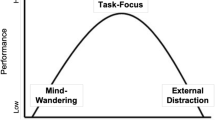Abstract
The number of jobs that takes place entirely or partially in a computer is nowadays very significant. These workplaces, as many others, often offer the key ingredients for the emergence of stress and the performance drop of its long-term effects: long hours sitting, sustained cognitive effort, pressure from competitiveness, among others. This has a toll on productivity and work quality, with significant costs for both organizations and workers. Moreover, a tired workforce is generally more susceptible to negative feelings and mood, which results in a negative environment. This paper contributes to the current need for the development of non-intrusive methods for monitoring and managing worker performance in real time. We propose a framework that assesses worker performance and a case study in which this approach was validated. We also show the relationship between performance and mood.




Similar content being viewed by others
References
Akerstedt T, Knutsson A, Westerholm P, Theorell T, Alfredsson L, Kecklund G (2004) Mental fatigue, work and sleep. J Psychosom Res 57(5):427–433. doi:10.1016/j.jpsychores.2003.12.001
Balkin TJ, Wesensten NJ (2011) Differentiation of sleepiness and mental fatigue effects. Balkin, Thomas J.; Wesensten, Nancy J. Ackerman, Phillip L. (eds) Cognitive fatigue: multidisciplinary perspectives on current research and future applications. American Psychological Association, Washington, DC, pp 47–66. doi:10.1037/12343-002
Carneiro D, Novais P (2014) New applications of ambient intelligence. In: Ambient intelligence-software and applications, Advances in Intelligent Systems and Computing, vol. 291. Springer, pp. 225–232
Curran S (1995) Short form of the profile of mood states (POMS-SF): psychometric information. Psychol Assess 7(1):80–83. doi:10.1037//1040-3590.7.1.80
Hart SG, Staveland LE (1988) Development of NASA-TLX (task load index): results of empirical and theoretical research. Adv Psychol 52:139–183
Jaber MY, Neumann WP (2010) Modelling worker fatigue and recovery in dual-resource constrained systems. Comput Ind Eng 59(1):75–84
Kobayashi H, Demura S (2006) Relationships between chronic fatigue, subjective symptoms of fatigue, life stressors and lifestyle in Japanese high school students. School Health 2:5
Lorist MM, Klein M, Nieuwenhuis S, De Jong R, Mulder G, Meijman TF (2000) Mental fatigue and task control: planning and preparation. Psychophysiology 37(5):614–625
McNair DM, Lorr M, Droppleman LF (1971) Manual for the profile of mood states. Educational and Industrial Testing Service, San Diego
Newcombe PA, Boyle GJ (1995) High school students’ sports personalities: variations across participation level, gender, type of sport, and success. Int J Sport Psychol 26:277
Perelli LP (1980) Fatigue stressors in simulated long-duration flight. Effects on performance, information processing, subjective fatigue, and physiological cost. Tech rep, DTIC document
Pimenta A, Carneiro D, Novais P, Neves J (2013) Monitoring mental fatigue through the analysis of keyboard and mouse interaction patterns. In: Hybrid artificial intelligent systems, Lecture Notes in Computer Science vol 8073, Springer, pp 222–231. doi:10.1007/978-3-642-40846-5_23
Pimenta A, Carneiro D, Novais P, Neves J (2015) Detection of distraction and fatigue in groups through the analysis of interaction patterns with computers. In: Intelligent distributed computing VIII, Studies in Computational Intelligence vol 570. Springer, pp 29–39. doi:10.1007/978-3-319-10422-5_5
Ramos C, Augusto JC, Shapiro D (2008) Ambient intelligence—the next step for artificial intelligence. IEEE Intell Syst 23(2):15–18
Samn SW, Perelli LP (1982) Estimating aircrew fatigue: a technique with application to airlift operations. Tech rep, DTIC document
Spielberger CD (2010) State-trait anxiety inventory. Wiley, Hoboken. doi:10.1002/9780470479216.corpsy0943
Tucker P (2003) The impact of rest breaks upon accident risk, fatigue and performance: a review. Work Stress 17(2):123–137
Williamson RJ, Purcell S, Sterne A, Wessely S, Hotopf M, Farmer A, Sham PC (2005) The relationship of fatigue to mental and physical health in a community sample. Soc Psychiatry Psychiatr Epidemiol 40(2):126–132
Acknowledgments
This work has been supported by COMPETE: POCI-01-0145-FEDER-007043 and FCT—Fundaçã para a Ciência e Tecnologia within the Project Scope: UID/CEC/00319/2013. The work of Davide Carneiro is supported by a Post-Doctoral Grant by FCT (SFRH/BPD/109070/2015).
Author information
Authors and Affiliations
Corresponding author
Ethics declarations
Conflict of interest
None.
Ethical approval
All procedures performed in studies involving human participants were in accordance with the ethical standards of the institutional and/or national research committee and with the 1964 Helsinki Declaration and its later amendments or comparable ethical standards.
Informed consent
Informed consent was obtained from all individual participants included in the study.
Additional information
Communicated by C. Analide.
Rights and permissions
About this article
Cite this article
Carneiro, D., Pimenta, A., Neves, J. et al. Non-intrusive quantification of performance and its relationship to mood. Soft Comput 21, 4917–4923 (2017). https://doi.org/10.1007/s00500-016-2380-y
Published:
Issue Date:
DOI: https://doi.org/10.1007/s00500-016-2380-y




